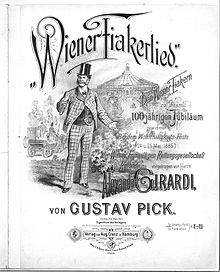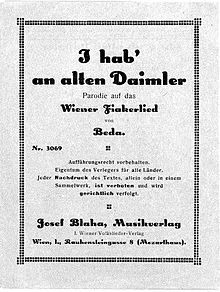Fiaker song
The Fiakerlied from 1885 is one of the most famous Viennese songs . Text and music are from Gustav Pick (1832-1921), who made it for a charity event of Princess Pauline von Metternich on 24./25. May 1885 on the occasion of the centenary of the Fiaker guild. The actor Alexander Girardi was the highlight of this Prater festival in the rotunda . The original manuscript has been owned by the Vienna Taxi Guild since it was purchased in the 1930s.
Due to its popularity, the Fiaker song was also often parodied. So "Beda" (wrote Fritz laborers ) in the interwar period, a modern text version for taxi drivers and sexy hints ( "I've got to old Daimler ...") A "North Germanic version" ( "Ick guide 'two colossal black horses") written Gerhard Bronner and Peter Wehle . Both also delivered a “modern version”, which begins like this: “I have four hard jets, I'm in the air”. During the National Socialist era , the Fiaker song was banned because of the composer's Jewish origins.
Lyrics based on the printed score (first verse)
I lead two harbe black horses,
my stuff is dodgy at the grave,
A like dö two
bustle , who have n't seen a lot,
A whips, there's
no such thing , Ui jessas just don't hit ,
the greatest part would lish 'ch',
otherwise z'reissens glei'in Wag'n.
I can drive from the trunk to the pleasure house in twelve minutes;
I can't jump into a gallop,
It’s just trapping, trapping, trapping;
When it’s really going to shoot afterwards, I feel it inside me,
That I have the right claws, that I am a cab driver.
Anyone can be a coachman,
but only drive kinnans in Wean.
Refrain:
My 'pride is, i'm stopping at a real Weanakind,
A Fiaker, how you can never find it every day,
My Bluat is as airy and light as the wind,
I'm stopping at a real Weanerkind.
literature
- H. Pemmer: Pick Gustav. In: Austrian Biographical Lexicon 1815–1950 (ÖBL). Volume 8, Verlag der Österreichischen Akademie der Wissenschaften, Vienna 1983, ISBN 3-7001-0187-2 , p. 61.
Web links
- Leaflet with 4 stanzas of the Fiaker song
- Paul Hörbiger on Youtube
- Manuscript page for the Fiakerlied in the Vienna History Wiki of the City of Vienna
Individual evidence
- ^ Elisabeth Theresia Fritz, Helmut Kretschmer: Vienna, music history: folk music and Viennese song: Part 1 . LIT, Vienna 2006, p. 366.
- ↑ Gerhard Bronner, Peter Wehle: The restless ball . Forum Verlag, Vienna 1963.
- ↑ Wolfgang Schaller (ed.): Operetta under the swastika: between acceptable art and "degeneration". Contributions to a conference of the Dresden State Operetta . Metropol Verlag, Berlin 2007, ISBN 978-3-938690-35-2 , p. 10.


